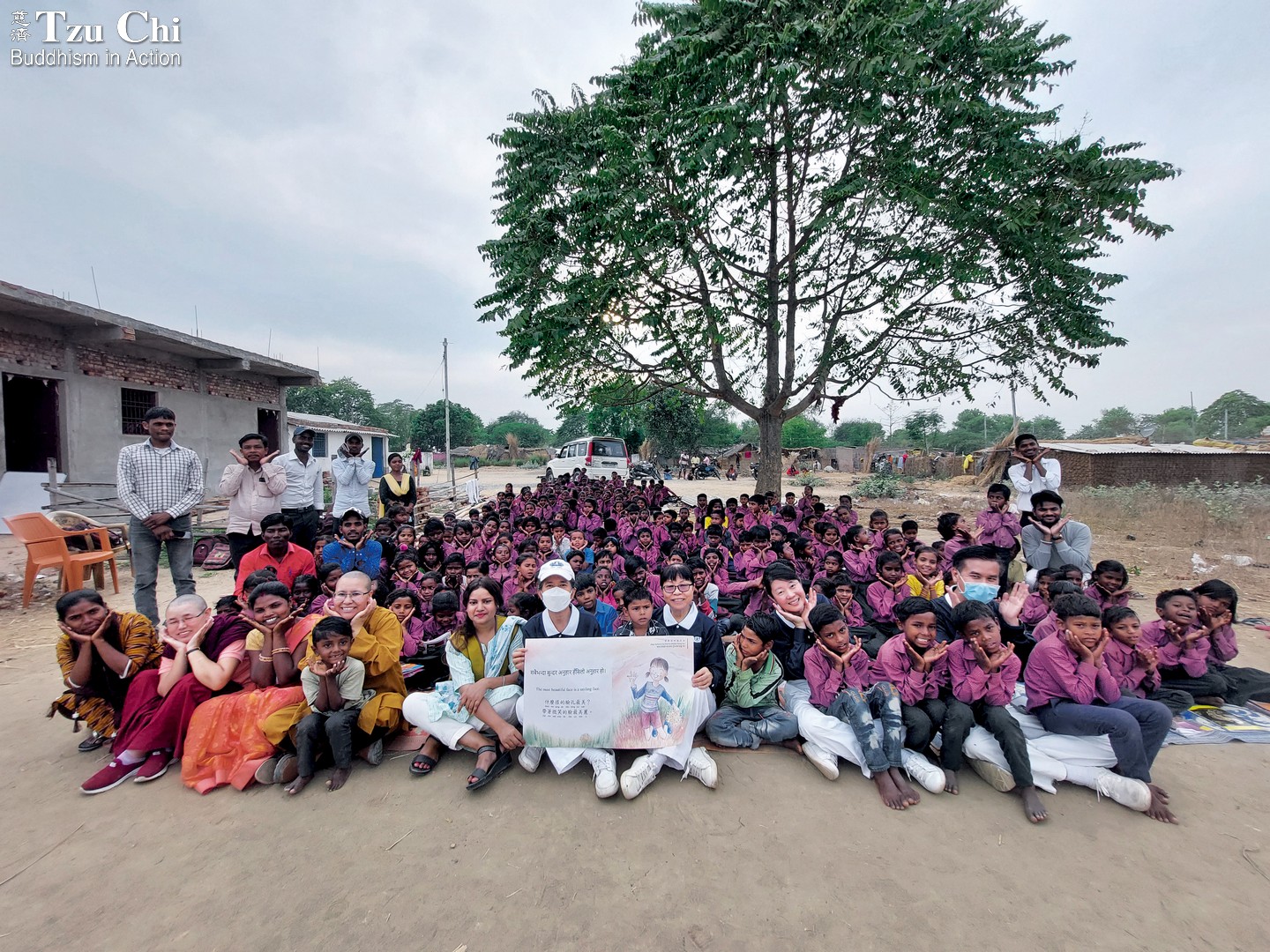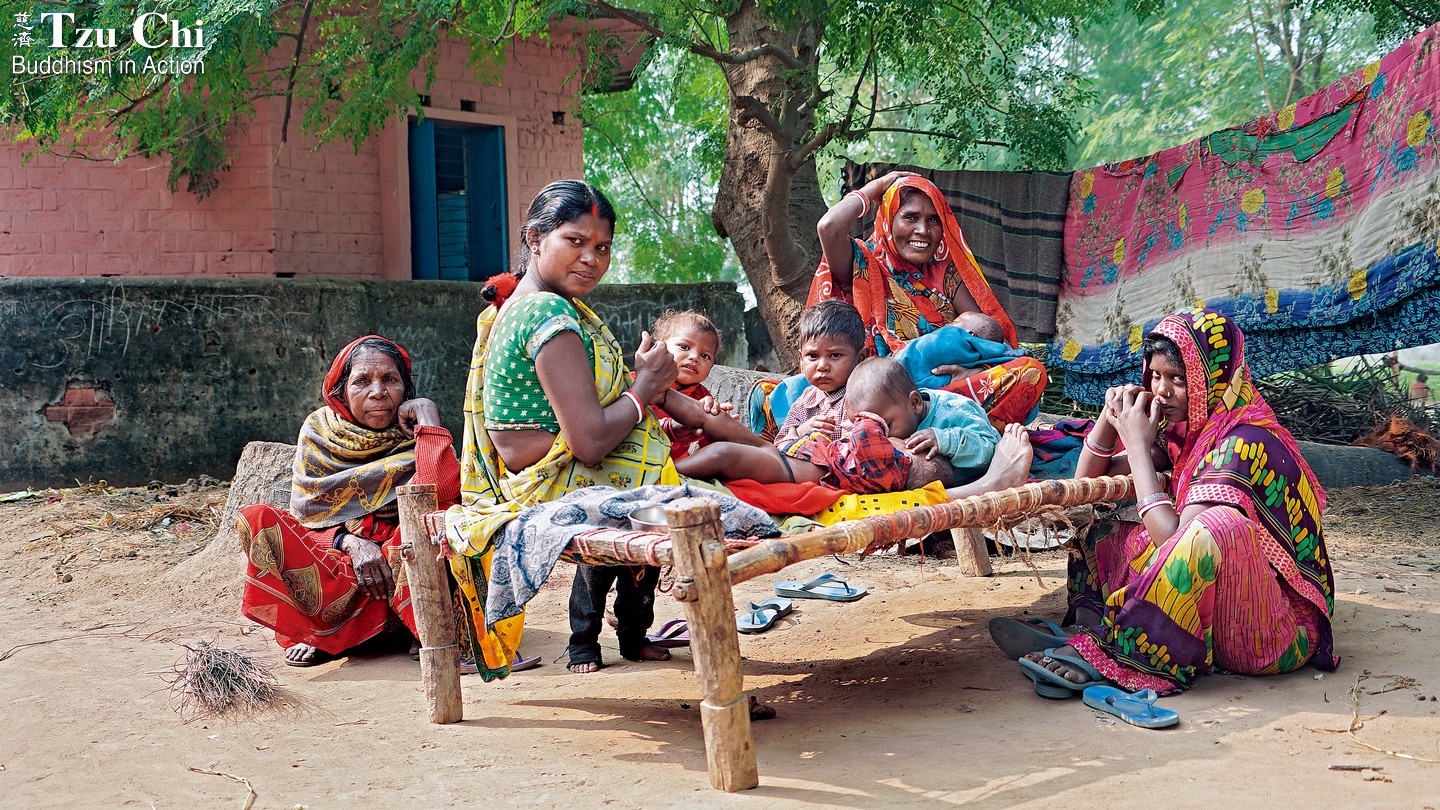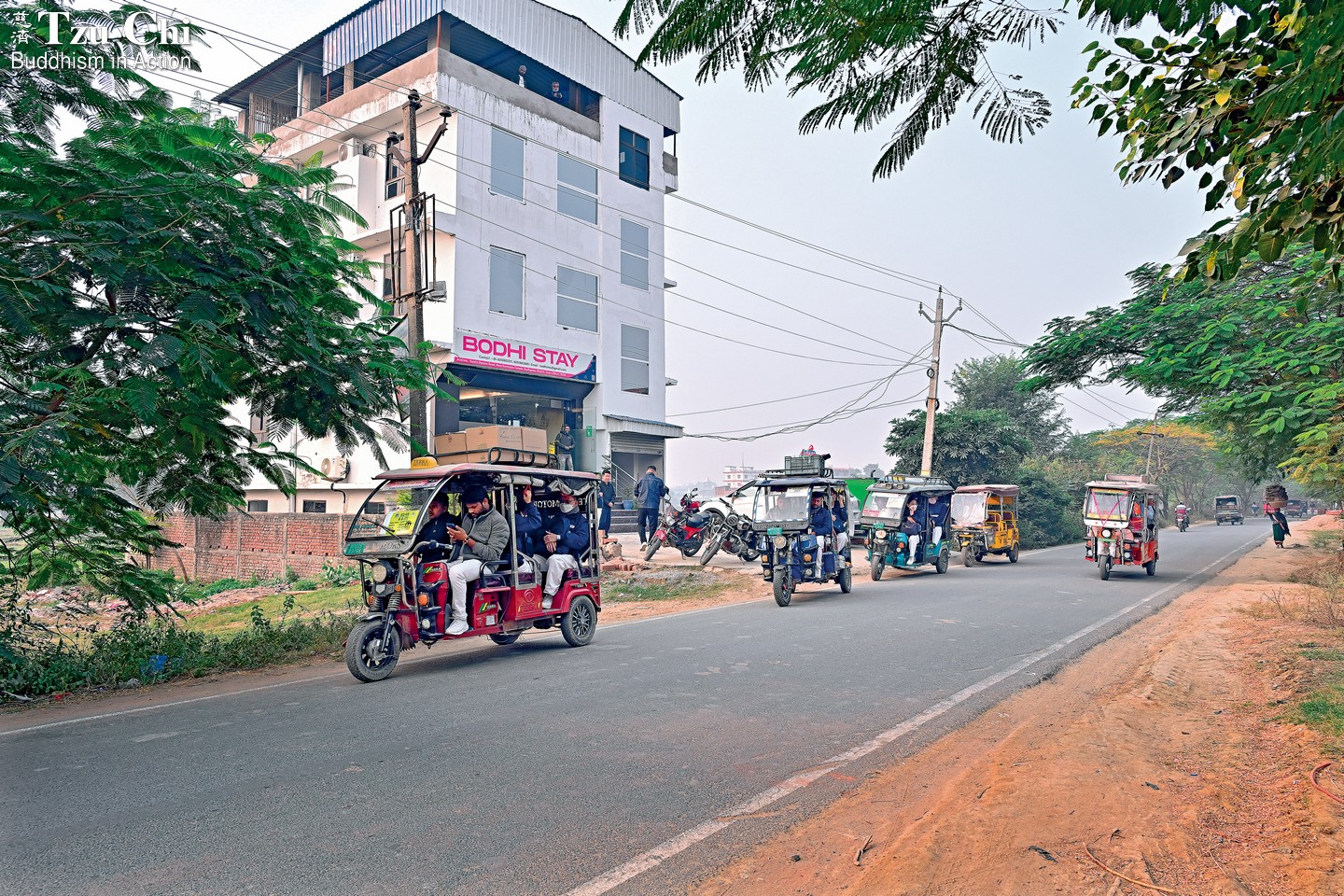By Ding Bi-hui
Translated by Wu Hsiao-ting
As the sun rises over Bodh Gaya, Tzu Chi volunteers convene to embark on a day of philanthropic work. Each day is a new day to make a difference.

Volunteers pose with students and teachers at a school in Silaunja after sharing Master Cheng Yen’s aphorisms there.
Teng Pick Cheang
The Tzu Chi Bodh Gaya office, standing tall next to adjacent fields, is just a 20-minute walk from the site of the Buddha’s enlightenment. Its walls are slowly illuminated as the morning sun rises at six. Locals arriving from all directions and volunteers staying at the office or nearby hotels meet on the first floor after seven. After exchanging greetings of “Good morning,” everyone is ready to start a day’s work.
A meeting focusing on the day’s tasks soon began. English is used for discussions during the meeting, although local volunteers typically converse in Hindi and those from Singapore, Malaysia, and Taiwan speak Mandarin. Midway through the meeting, tuk-tuks carrying female villagers from Silaunja arrive. They have come here to attend the sewing class that starts at eight. Participants from Bakraur village will arrive later for a second sewing class. Both sessions are led by sewing teacher Pinke Devi.
Around 20 volunteers head out after the morning meeting, forming groups and boarding tuk-tuks to travel to impoverished villages or schools around Bodh Gaya. With winter in full swing, the temperature undergoes significant changes within a single day, ranging from seven or eight degrees Celsius (44.6-46.4°F) in the early morning to over 20 degrees Celsius (68°F) by noon. Volunteers from outside of India strive to adapt to the local conditions as they work tirelessly to provide warmth and support to those in need.
Empowering change
The caste system in India has endured for thousands of years, significantly impacting the lives of its residents. With a current population exceeding 1.4 billion, a staggering 230 million people at the bottom level live lives of poverty. According to United Nations statistics, India has the highest number of impoverished people in the world.
Tzu Chi volunteers from Malaysia and Singapore have established a presence in Bodh Gaya, nestled in the Gaya district in the Indian state of Bihar, since March 2023. Bodh Gaya holds a special significance among the eight major Buddhist pilgrimage sites, yet today stands as one of the poorest regions in India. Volunteers hope to do what they can to improve local lives. Building on their experiences in Lumbini, the Buddha’s birthplace in Nepal, they have extended their efforts to Bodh Gaya, launching local charitable, medical, and educational initiatives.
Among these initiatives, the charity team conducts visits to and aids the impoverished. They also organize vocational training classes in sewing, English, and computers to help residents acquire valuable skills. Among other tasks, the medical team’s responsibilities include accompanying patients for medical treatment, providing home care, offering health checkups, and assisting villagers in overcoming alcohol addiction.
The education team currently cares for ten schools. They share Dharma Master Cheng Yen’s inspirational aphorisms in the schools and organize athletic events to foster teacher-parent-student relationships. Volunteers from Taiwan have organized into a relay for documenting work—when one team leaves, another arrives to take over their work. They work with local volunteer Amar Kumar to record the current situation in Bodh Gaya, document volunteers’ work, and capture stories of kindness and goodness through images, text, and videos.
Local volunteers play an indispensable role in the different teams’ activities. Being members of the local community, they provide helpful insights into the local environment and the living conditions of the residents. This shortens the learning curve for overseas volunteers, making the local volunteers valuable assistants in carrying out Tzu Chi’s philanthropic endeavors locally.
Whether staying long-term or visiting short-term, volunteers from overseas follow the mission of “Spread the Dharma and Benefit All Beings.” Abiding by Master Cheng Yen’s instructions, they also strive to inspire more locals to join Tzu Chi, hoping that one day they might stand on their own. But until that becomes a reality, volunteers from outside of India still need to visit to organize local affairs. Charitable aid and medical care involve long-term commitments. How do overseas volunteers, constrained by the limited duration of their stay and their own personal and professional responsibilities in their home countries, sustain assistance without falling short? The story of Tetari Kumari, a 20-year-old woman, is a good example.
In May 2023, volunteers discovered Tetari in Rattibigha village. She had struggled with a foot ailment since childhood, which eventually led to her foot being amputated at the ankle. Unfortunately, the surgery didn’t improve her condition, nor could she afford additional treatment, due to her family’s poverty. Learning of her years of enduring pain and swelling, volunteers decided to assist her in obtaining further medical treatment, pledging to cover all the expenses for another amputation surgery and the fitting of a prosthetic limb.
Tetari returned home after the surgery, but the inadequate medical conditions in the local village and the poor conditions of her own home environment hindered her recovery. In response, Tzu Chi’s medical team visited her daily to change the dressing. Volunteer Lim Kim Yan (林金燕), a retired nurse from Singapore, cared for her for months. However, due to personal matters, she had to temporarily return to Singapore. To fill in for her, another retired nurse, Chong Ah Yok (章愛玉), was specially called in from Singapore to take over Tetari’s care. Chong arrived on November 20. Her luggage, weighing up to 30 kilograms (66 pounds), consisted mainly of supplies for Tetari, including disinfectant gauze, bandages, disinfectant solutions, and surgical instruments. She continued changing Tetari’s dressings for more than a month.
During this period, the pus from Tetari’s wound gradually changed from a light blue to a pale yellow, and with the removal of necrotic tissue, the wound healed day by day. When Chong prepared to return to Singapore on December 29, she visited Tetari again that morning to change her dressings. By then, the once fist-sized, horrible-looking wound had shrunken into a small area. She was relieved to see Tetari no longer suffering.
Chong’s dedication went beyond mere time and expertise; it reflected a compassionate heart that could not bear to see others suffer. Tetari and her parents deeply felt this compassion. When Chong was leaving that day, Tetari’s father, Sukar Manjhi, who usually stood solemnly outside during the dressing changes, took the initiative to join Chong and others for a group photo.

A woman in Bakraur greets Tzu Chi volunteers, who are a familiar sight to local villagers now.
Ye Jin-hong
The ripple effect of goodness
Currently, Tzu Chi’s primary focus for charitable assistance and medical care includes Bodh Gaya and nearby areas. Villages such as Silaunja, Bakraur, Ganga Bigha, Jagdishpur, Ghogharia, and Hathiyar have all borne witness to the philanthropic efforts of volunteers.
Among the villages, Jagdishpur sits at the foothills of Pragbodhi Hill. (Pragbodhi means “prior to enlightenment.”) It is believed that the Buddha spent six years practicing asceticism in a cave on this hill during his journey seeking enlightenment. This cave is now a significant tourist destination. Many villagers in Jagdishpur sustain themselves by seeking alms from pilgrims who visit this sacred site.
On December 14, 2023, a Tzu Chi team of five members, including Chong Ah Yok and Endrajeet Paswan—who also served as a translator—visited Jagdishpur to distribute protein-rich beans to malnourished villagers. As their tuk-tuk came to a halt at the village entrance, children eagerly approached, extending their hands and asking for money in simple English. This was a familiar scene for the volunteers, who had frequented the village to visit underprivileged households, conduct health checkups, and distribute aid.
The volunteers distributed beans and conducted weight checks for seven households during their visit. Unfortunately, they also encountered villagers who shouted at them and complained about not receiving supplies. The volunteers simply smiled and nodded as they passed the hecklers, but Surendra Paswan, the driver of the tuk-tuk carrying the volunteers and volunteer Endrajeet’s elder brother, couldn’t contain his anger when he saw and heard the irrational villagers. He shouted back at them.
When he saw this, Endrajeet took off his volunteer vest and asked his brother to wear it. He then invited his brother to participate in the subsequent bean distribution. When other volunteers asked Endrajeet why he did that, he replied that he wanted his brother to think of himself as a Tzu Chi volunteer. It was a way to remind him to maintain inner calm. When one is calm, one is better able to handle challenging situations.
The elder brother understood his younger brother’s intentions and reflected on his behavior. He said that he had seen how his brother had changed after working with other Tzu Chi volunteers—he had begun to speak more softly, and his temper had significantly improved. He was happy for his brother and had begun thinking of becoming a volunteer too.
The ripple effect of goodness was spreading. When the team reached Ganga Bigha village, a local suddenly emerged, bringing fresh guavas to the volunteers. Endrajeet immediately recognized him, for it was none other than Tetari’s father, Sukar Manjhi.
Volunteers return to the Tzu Chi office from various locations as the sun sets each day, often crossing the bridge over the Niranjana River. Over 2,500 years ago, the Buddha emerged from his cave of ascetic practice, bathed himself in the Niranjana River, and accepted milk-rice from a woman named Sujata. With renewed strength, he crossed the river and ultimately attained enlightenment under a bodhi tree.
The very site where the Buddha reached enlightenment is now home to the renowned Mahabodhi Temple. On clear days, volunteers can see the temple bathed in the sunset while crossing the Niranjana River. In these moments of serene beauty, they offer silent prayers, hoping that the Buddha’s teachings of kindness, wisdom, and inner peace can flourish locally. They envision that the spark of light kindled in one heart can pass from one to another, illuminating the path for ever more people.

Outside the Tzu Chi Bodh Gaya office, tuk-tuks carrying volunteers and aid supplies are ready to set out for visits to those in need.
Lin Jia-ru



